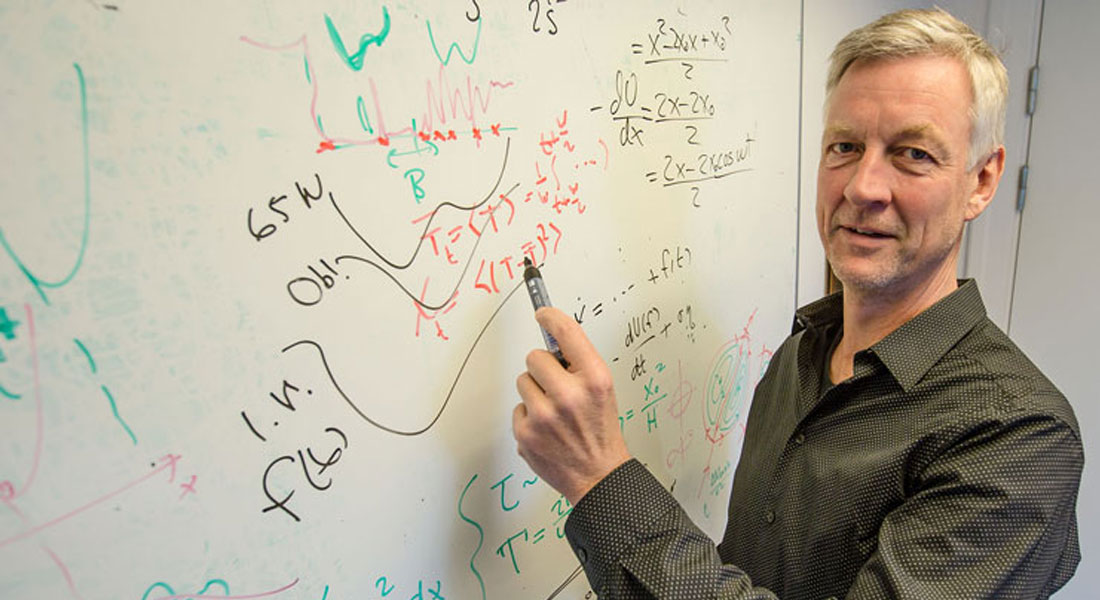The Niels Bohr Institute kick starts a new generation of climate scientists
There is a pressing need for skilled climate scientists with excellent insight into advanced mathematical theories as well as the physics of the Earth system. A European scientist training programme, CriticalEarth, orchestrated by Peter Ditlevsen, Physics of Ice, Climate and Earth at the Niels Bohr Institute, University of Copenhagen is addressing the problem.

Climate science is developing quickly. Advanced mathematical techniques are increasingly being incorporated in the analysis of results from classical, dynamical computer simulations.
This has created a need for a new type of climate scientist. One, which not only has a well-founded understanding of the climate system, the ecology of Earth and the many challenges of climate change, but in addition is educated in the relevant advanced mathematical theories.
A scientist training programme
The Trans-European scientific project CriticalEarth, led by the Niels Bohr Institute of The University of Copenhagen is designed to meet this demand.
In the CriticalEarth scientist training programme 15 PhD international students will learn innovative mathematical approaches to solving the most pressing challenges of climate science today, through a network of 17 European research institutions .
The project is a Marie Skłodowska-Curie Actions - Innovative Training Network, one of the most prestigious and competitive science programmes under the EU Horizon 2020 which fund it with more than 4 million Euros. All PhDs are being advertised on www.criticalearth.eu site.
CriticalEarth has been initiated by Peter Ditlevsen from the Niels Bohr Institute, who is also the daily leader. The project involves a range of internationally leading climate scientists from leading European climate science institutions.
Two pressing problems
The new generation of climate scientists will be directly involved in the joint international effort to find answers to the two largest challenges of climate science.
These essential questions about the Earth system are especially concerning, as lack of knowledge limits the detailed understanding of how anthropogenic emissions of CO2 will change the climate.
From studies of the past climates, it is known that large changes to the climate were not gradual but rather abrupt transitions. The Earth system seems to have a resilience to changes but then abruptly shift from one state to another after passing a threshold – a so-called tipping point.
Many of the sub-elements of Earth's climate system are likewise characterized by abrupt shifts involving tipping points. This is known to be the case in the Amazon rainforest, the ice sheets in the Arctic as well as in Antarctica, the sea ice in the Arctic Ocean, and the ocean currents in the North Atlantic. These systems all have thresholds after which they pass through permanent, non-reversible changes.
Climate models fail
The climate models on which the IPCC base its assessment reports do not reproduce such abrupt shifts in neither the climate system as a whole nor the elements of the climate system.
Quite on the contrary, these advanced state of the art computer simulations predict that climate change will be a smooth process as the amounts of CO2 in the atmosphere rise.
Of course, this is a serious situation, as we thus have no idea whether our yearly addition of CO2 in the atmosphere might trigger an abrupt change to the climate system because an unknown threshold is met. Since the 1880s' humanity has increased the content of CO2 in the Earth's atmosphere by approximately 45% from 280 to 415 ppm. Currently, this number is growing by roughly 2 ppm per year.
Uncertainty
Another serious challenge for the advanced climate models is the uncertainty on how much the Earths surface temperatures will rise if the amount of CO2 in the atmosphere is doubled.
The number is known as the Climate Sensitivity and is today estimated to be within 1.5 and 4.5 degrees Celsius. In spite of large improvements to climate models throughout decades it has not been possible to reduce the uncertainty significantly since it was first calculated in the 1970s.
It is hoped, that the incorporation of new mathematical theories in the climate sciences will contribute to overcoming these two main challenges. The CriticalEarth project is thus designed to strengthen these particularly important areas of investigations in climate science.
The CriticalEarth project starts up in March 2021 and runs through a three-year period.
For details of the 15 PhD vacancies, please visit www.criticalearth.eu
CriticalEarth (grant agreement 956170) is funded by EU's Marie Skłodowska-Curie
Actions Research networks ITN - Innovative Training Networks: https://www.criticalearth.eu/
Contributing universities and science institutions:
- Niels Bohr Institutet, Københavns Universitet, Danmark.
- Department Mathematics and Computer Science, Freie Universität Berlin, Tyskland.
- Department of Mathematics, Technische Universität München, Tyskland.
- Department of Mathematics, Norges Arktiske Universitet, Norge.
- Department of Physics, Utrecht University, Holland.
- Department of Mathematics, University of Exeter, Storbritannien.
- Department of Physics, University of Reading, Storbritannien.
- Department of Environmental Engineering, Politecnico di Torina, Italien.
- Department of Atmospheric Science, Koninklijk Meteorologisch Instituut, Holland.
- Laboratoire de physique, ENS de Lyon, Frankrig.
- Department of Earth Physics and Astrophysics, Universidad Complutense Madrid, Spanien.
- Institute for Chemistry and Biology of the Marine Environment, Carl von Ossietzky Universität Oldenburg, Tyskland.
- Earth and Life Institute, Université Catholique de Louvain, Belgien.
- Department of Atmospheric Science, Consiglio Nazionale delle Ricerche, Italien.
- Department of Research and Development, Danmarks Meteorologiske Institut, Danmark.
- Department of Climate Science, Potsdam Institute for Climate Impact Research, Tyskland.
Topics
See also:
Contact
For more information, contact Peter Ditlevsen, Niels Bohr Institute, pditlev@nbi.ku.dk
Marked- and communication-related partners in the project:
- Climate Risk Analysis, Tyskland.
- Amigo Climate, Italien.
- David Trads Management, Danmark.
